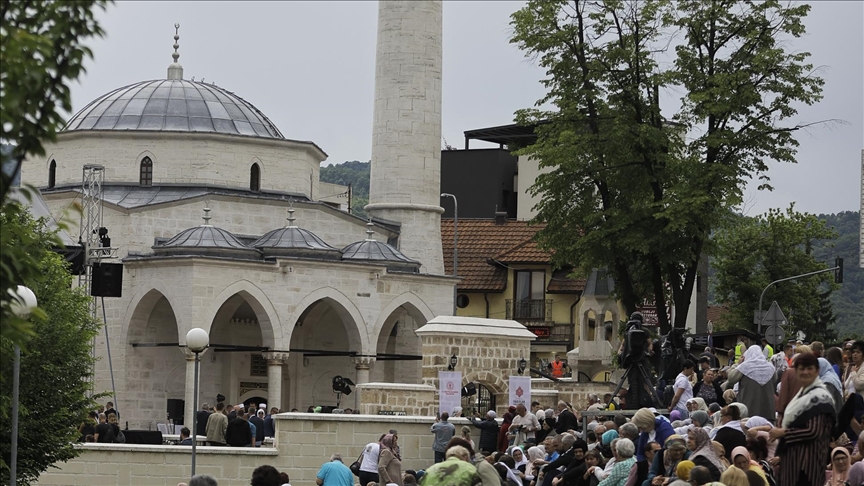Bosnia Herzegovina reopens 16th-century Ottoman Empire-era mosque
Türkiye's Directorate of General Foundations rebuilds Arnaudija Mosque in Banja Luka city as Bosnia Herzegovina celebrates Mosque Day

BELGRADE, Serbia
Bosnia Herzegovina on Tuesday reopened the 16th-centry Arnaudija Mosque in Banja Luka city after nearly seven years of reconstruction.
The country also marks the Day of Mosques with informative events across the country.
The small Balkan country, which survived massive shelling in the 1990s, as well as massacres, and the 1995 Srebrenica genocide, commemorates May 7 as Mosque Day.
The Arnaudija Mosque, which was destroyed during the Bosnian War in 1993, was rebuilt to its original state as part of the reconstruction work carried out by Türkiye's Directorate of General Foundations.
The inauguration to open the mosque's door for the faithful was attended by Turkish Minister of Culture Mehmet Nuri Ersoy, President of Religious Affairs Ali Erbas and Bosnia's Serb entity, Republika Srpska President Milorad Dodik.
Ersoy said in his speech that the Arnaudija Mosque was built on peace, brotherhood, and tranquility.
"Our historical unity has made us part of a common destiny, so we will further strengthen our bond with the Balkans today and tomorrow, as we did yesterday. We will continue to do our best to maintain peace and stability in the Balkans.
“The Arnaudija Mosque, also known as the Defterdar Mosque, was built with a focus on peace, brotherhood and tranquility,'' said Ersoy.
Dodik called what happened 30 years ago a "mistake" and said they did not believe it was appropriate to demolish religious buildings.
"I would like to express my gratitude to the Republic of Türkiye and other institutions for their assistance in the mosque’s reconstruction. The only thing we all need to work towards is peace. I will defend living in peace, preserving peace and stability, and ensuring equal rights for all of you," Dodik said.
He also mentioned that the mosque has been beautifully rebuilt.
The Arnaudija Mosque in Banja Luka, Bosnia and Herzegovina, was one of 16 mosques destroyed during the war.
It was originally constructed in the 1590s during the Ottoman Empire. It suffered its first significant damage in the 1963 earthquake.
On May 7, 1993, however, Bosnian Serbs destroyed the Arnaudija Mosque and the Ferhadiye Mosque in the city by placing dynamite underneath.
Türkiye's Directorate of General Foundations completed the mosque's reconstruction work following a groundbreaking ceremony in 2017.
The Islamic Union of Bosnia and Herzegovina declared May 7, the day the Arnaudija and Ferhadiye mosques were demolished, as Mosque Day, and has been organizing events in all of the country's mosques since 1998.
However, it was not the only mosque demolished during the war.
According to Bosnia's Islamic Union, 614 mosques, 218 prayer rooms, 69 Quran course sites, four dervish lodges, 37 tombs, and 405 pieces of historical heritage that belong to Muslim foundations were destroyed.
Some 534 mosques in territories controlled by Serb forces were destroyed, while 80 mosques were destroyed in territories under Croat forces.
According to the union, 80% of the 1,144 mosques in Bosnia were destroyed or damaged.
In addition to the mosques and other religious structures that have been demolished, Serb and Croat forces have killed over 100 imams or prayer leaders of mosques.
According to current statistics, Bosnia has 1,912 mosques. And 789 of the mosques and prayer rooms that were destroyed have been restored to service, while another 89 are being rebuilt from the ashes.




